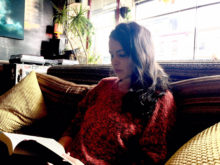Laura McPhee-Browne
 Laura McPhee-Browne is a writer and social worker from Melbourne, Australia. She is currently working on what she hopes will be her first book, ‘Cooee’, a collection of echo stories inspired by the short fiction of her favourite female writers.
Laura McPhee-Browne is a writer and social worker from Melbourne, Australia. She is currently working on what she hopes will be her first book, ‘Cooee’, a collection of echo stories inspired by the short fiction of her favourite female writers.You can find her at https://lauramcpheebrowne.com
Wet Towards the Waterfall
for Silvina Ocampo
We fell in love quickly, he and I. That was certainly my way, to dive in without testing the water with my toes, to sweep up the consequences, later murmuring, “well at least I lived”. For him I could sense that it was an abnormality; that he was in above his head, that he was used to taking months where we were taking hours. But there was never a question of stalling, of taking
=================================Sorry you must be logged in and a current subscriber to view the rest of this content.
Please login and/or purchase a subscription.